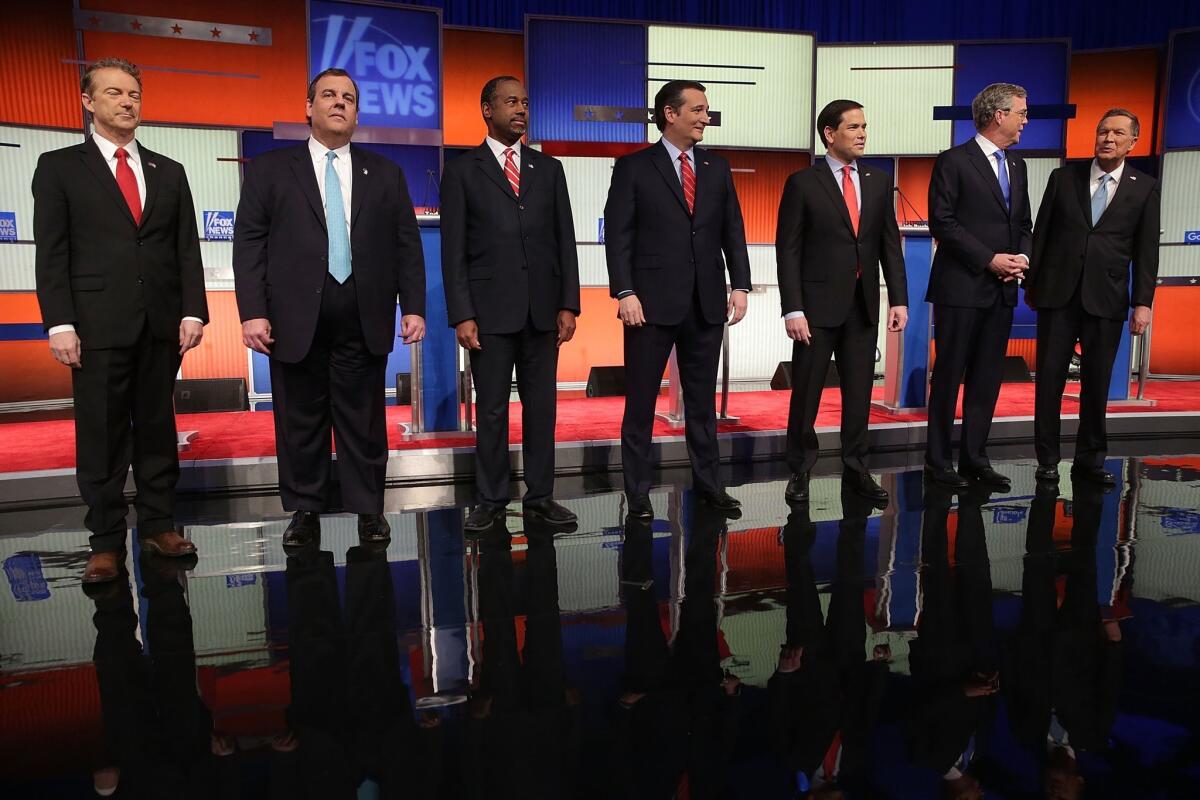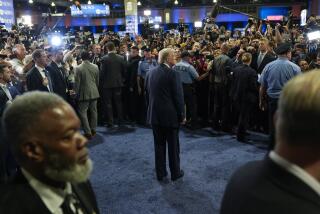Analysis: Even in boycott, Donald Trump succeeds in winning Republican debate

The Republican presidential candidates, minus Donald Trump, gather in Des Moines for Thursday night’s debate.
The unorthodox political strategy that has kept Donald Trump at the top of the Republican presidential field may have triumphed again with his much-disputed decision not to attend Thursday’s televised debate in Iowa.
He was not there to be pierced by video clips employed to great effect against other candidates by the Fox News moderators. He was not there to attract insults from the rest of the pack, and in his absence few were offered. He was not there to step into any sort of quicksand that might have threatened his national lead and his strength in Iowa, where the first votes will be cast in caucuses Monday night.
Without Trump onstage, Republicans saw the contest as they had imagined it long ago, before the New York real estate developer began his lengthy domination of the race. Some candidates responded by faltering and some found momentum.
Texas Sen. Ted Cruz and Florida Sen. Marco Rubio, vying for prominence below Trump, got the added stage time each has desired as they battle for the territory below the front-runner. But both appeared churlish at times and may have suffered from an extended fight over immigration, which included video clips in which each man contradicted his more recent statements which he then had to explain from the stage.
Retired neurosurgeon Ben Carson, who at one time challenged Trump in this outsider year, continued to fade from view, almost comically jolted back into the conversation at one point.
Former Florida Gov. Jeb Bush, by contrast, acted like a candidate freed from bondage. He spoke concisely, confidently and occasionally argumentatively, a sharp reversal of his performances in earlier debates when he appeared listless and backed away from conflict, particularly with Trump.
Ohio Gov. John Kasich and New Jersey Gov. Chris Christie, two other wearers of the establishment mantle, also displayed more of a presence than they had in past debates. Like Bush, however, their audience was less Iowa than New Hampshire, whose Feb. 9 primary each hopes will provide a better opportunity to break out of a tightly knit pack of trailing candidates.
Although he insisted he was staying offstage because of insults from Fox, Trump’s decision was a classic front-runner’s move, calculated to avoid any potential damage he could have done to his own cause with the caucuses so near. Whatever gains he might have made -- and Trump hadn’t been the best debater during any of the six previous debates -- were offset Thursday by the trouble he avoided. And in the end, the veterans’ event he staged to conflict with the debate received the attention he might have wanted anyway.
Trump’s departure left Cruz as the preeminent candidate on stage, and the result was not what Cruz might have hoped. Fox anchor Megyn Kelly asked Cruz to square his praise and his criticism of the candidate she called “the elephant not in the room.” And then he was challenged by moderator Chris Wallace on whether his votes on military issues matched his incendiary rhetoric about fighting ISIS.
He replied by asserting -- incorrectly -- that the United States had carpet-bombed Iraq in the first Gulf War, a tactic he has said he would use against ISIS even though it is considered a war crime. (Although the Persian Gulf war bombing was incessant, it was targeted at military sites and sought to avoid civilian casualties.) Rubio then jumped on Cruz, saying that the Texan hadn’t taken action as a senator to rebuild the military.
“The only budget that Ted has ever voted for is a budget that Rand Paul sponsored that brags about cutting defense spending,” Rubio said, knocking Cruz and the Kentucky senator standing nearby.
A short time later, Cruz tangled with moderator Chris Wallace in a lengthy complaint.
“Chris, I would note that that the last four questions have been, ‘Rand, please attack Ted. Marco, please attack Ted. Chris, please attack Ted. Jeb, please attack Ted,’ ” he said.
“It is a debate, sir,” Wallace replied.
“Gosh, if you guys ask one more mean question I may have to leave the stage,” Cruz said to murmurs from the crowd. He appeared to be joking but the jest nonetheless had a whining tone that probably did not help him.
Among the sharpest condemnations of Cruz came from the moderators. After airing a clip showing Cruz repeatedly talking in favor of some form of legal standing for those in the country without proper papers, Kelly turned to Cruz.
“Was that all an act?” she asked. “It was pretty convincing.”
Rubio and Cruz tangled repeatedly on the issue of immigration, with the Florida senator claiming in rather personal terms that his Texas counterpart was misrepresenting his past.
“This is the lie that Ted’s campaign is built on,” Rubio said of Cruz’s insistence that he never backed legal status for undocumented immigrants.
But Rubio too came under fire for his authorship of the “Gang of 8” immigration plan, passed by the Senate, that would have provided a path to citizenship for up to 11 million people. He parried with Kelly about whether he was thus supporting “amnesty” as he had defined it -- she provided a clip as backup.
Throughout, the back-and-forth played to negatives that have haunted both candidates: That Cruz wields ambition, not principle, and will say whatever necessary to win, and that Rubio is far more liberal on immigration than his party’s angry base. (Rubio seemed intent on bridging the anger gap, shouting at many points, including when he discussed his religion.)
That the criticisms came from representatives of the average Republican primary voter’s most popular media outlet added to the potential for injury.
As war raged between the two middle-tier candidates, those below them in national and state polls enjoyed the sight, for the destruction of those above provides their only clear path to victory. Christie, who has taken on the debate role of outsider mocking the ways of the Beltway, got off one of the best lines of the night as the two senators bickered over parliamentary moves in the immigration debate.
“I feel like I need a Washington-to-English dictionary converter, right?” he said to applause.
Bush added to the moderator’s questioning of Rubio by saying that his onetime protégé had “cut and run” when it became obvious to him that his immigration policy “wasn’t popular amongst conservatives” — in effect, telling both sides Rubio was disloyal and opportunistic, notes that a super PAC promoting Bush is also hitting in ads.
Bush’s demeanor at the debate was wholly in keeping with the candidacy he had promised back in the heady days after his carefully crafted announcement but has not consistently delivered. Asked about his foreign policy and other topics, he ticked off his talking points firmly and sometimes humorously. He even appeared to be standing taller. He seemed to have escaped the spell of the elephant not in the room.
He opened the debate by mocking the absence of his foil, in a way calculated to tell voters he deserved to go one-on-one against Trump.
“We always had such a loving relationship in these debates and in between and the tweets,” said Bush, who has been hazed for months by Trump as a low-energy loser. And then Bush served up a reminder:
“Everybody else was in the witness protection program when I went after him on behalf of what the Republican cause should be: conservative principles, believing in limited government, believing in accountability. Leading by fixing the things that are broken.”
See more of our top stories on Facebook >>
But it was noteworthy that Bush’s words came in response to a question implying that by staying in the race, establishment candidates like him were handing the race to Trump. In other words, that time had run out for him in a contest so utterly dominated by a different type of candidate, in a year where candidates like him were disdained.
Bush denied it, of course, and fell back on the truisms uttered by all trailing candidates: That the race has only begun, that the voters will decide all this, and that on Monday a more legitimate winnowing will begin.
For political news and analysis, follow me on Twitter: @cathleendecker . For more on politics, go to latimes.com/decker.
ALSO
Sanders tries to be the next Barack Obama in Iowa, not the next Howard Dean
How Martin O’Malley could decide who wins the Democratic caucuses in Iowa
Republican rivals take advantage of Trump’s absence in Iowa presidential debate
More to Read
Get the L.A. Times Politics newsletter
Deeply reported insights into legislation, politics and policy from Sacramento, Washington and beyond. In your inbox three times per week.
You may occasionally receive promotional content from the Los Angeles Times.











